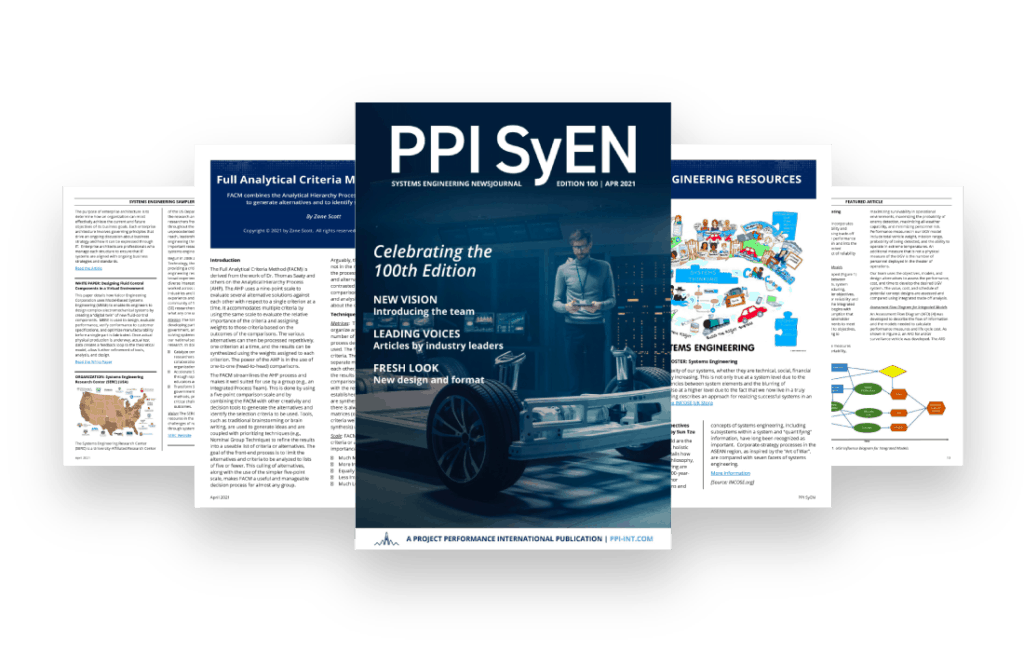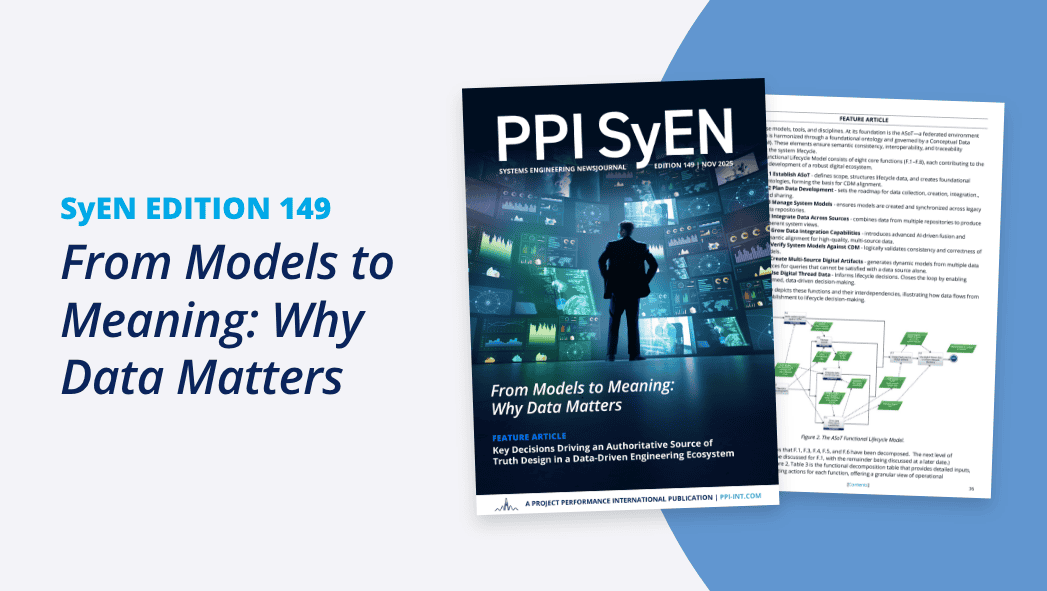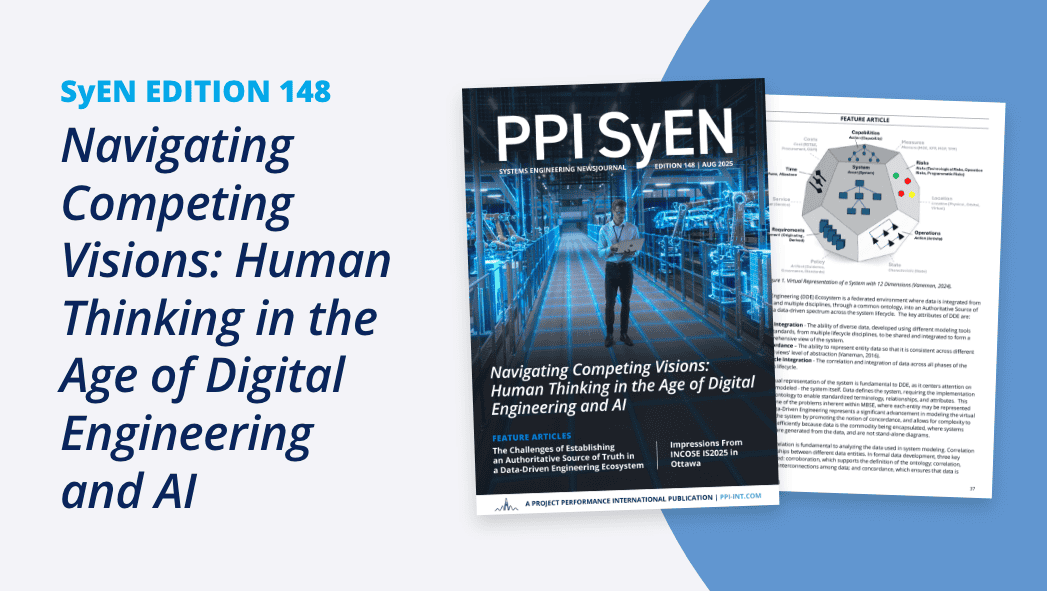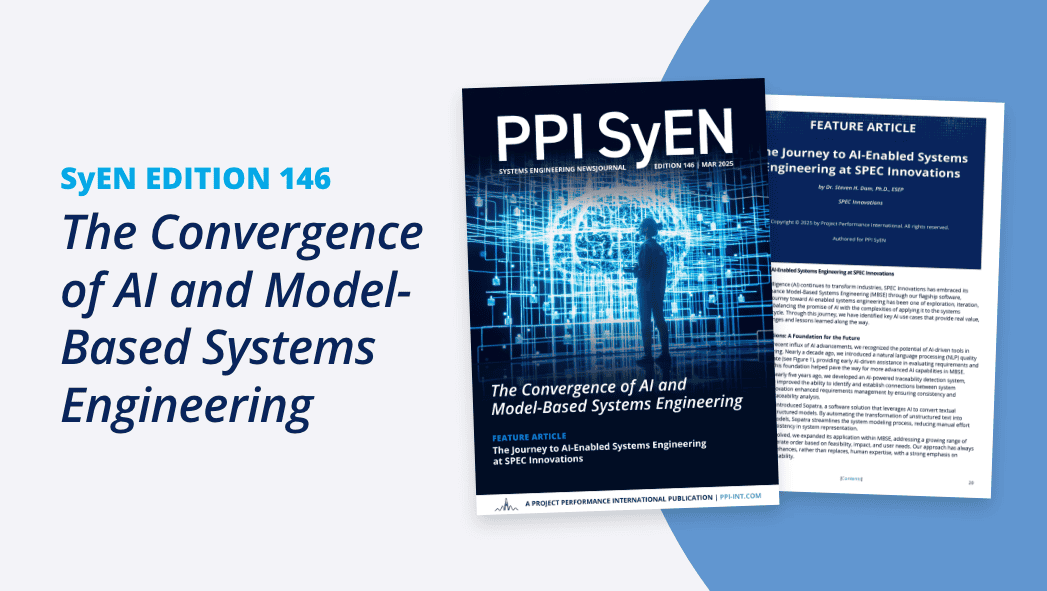WHAT’S INSIDE:
A Quotation to Open On
Systems Engineering News
- Upcoming Submission Deadlines and Themes for INSIGHT
- INCOSE Event Calendar
- Cradle® January 2011 Newsletter
- Establishment of INCOSE Reliability Engineering Working Group
- U.S. Department of Defense Releases Systems 2020 Request for Information
- Systems Engineering Volume 14 Issue 1
- NASA ESMD Systems Engineering Paper Competition
- Major Systemic Failures – Prevention Approach Needed
- Can you Help Create World Class Business Analysts? Submit a Presentation to Business Analysis Forum 2011
Featured Societies – TBD
INCOSE Technical Operations – Power & Energy Working Group
Systems Engineering Software Tools News
- isee systems Live Web Seminar – Exploring Options for Creating Online Simulations
- Atego 1 Day Tutorial – Introduction to Model-Based Requirements Engineering
- Ravenflow Launches Business Analyst Building Blocks Program
- Launch of Artisan Studio ParaSolver speeds the exploration of complex SysML systems design alternatives
Systems Engineering Books, Reports, Articles and Papers
- Requirements Engineering for Software and Systems
- Control Systems Engineering
- Customer Service Incorporates Systems Thinking in 2010
- Modeling Dynamic Systems – Third Edition
- Requirements Engineering: Fundamentals, Principles, and Techniques
- Engineering Mega-Systems: The Challenge of Systems Engineering in the Information Age
- 10 Useful Ideas on Systems Thinking
- Panarchitecture: Architecting a Network of Resilient Renewal
- Systems of Systems: Managing Complexity
Conferences and Meetings
Education and Academia
- Systems Modeling Language (SysML) Training – A Quick Start to Model-Based Engineering and Model-Based Systems Engineering (MBE/MBSE)
- DoD Systems Engineering Research Center (SERC
- Summer Courses at Harvard – Systems Thinking
- ISU/Stevens Graduate Certificate in Space Systems Engineering
- Immediate Postdoctoral Opening in Systems Requirements Engineering at Masdar Institute
- Assistant Professor of Systems Engineering (2 Positions)
- Newcastle University: Lectureship in Dependable Architectures
- Immediate Postdoctoral Opening in Systems Requirements Engineering at Masdar Institute
Some Systems Engineering-Relevant Websites
Standards and Guides
- ISO/IEC JTC 1/SC 35 – User interfaces
- IEEE Standards Association (IEEE-SA)
- Should SC7 Develop Competency Standards
A Definition to Close on
PPI News
Systems Engineering News
Upcoming Submission Deadlines and Themes for INSIGHT
INSIGHT is the newsletter of International Council on Systems Engineering. It is published four times per year (January, April, July, October). INSIGHT features status and information about INCOSE’s technical work, local chapters, and committees and boards. Additionally, related events, editorials, book reviews, trends, and how-to-do articles that are pertinent to the many aspects of a systems engineer’s job are also included, as space permits.
Upcoming submission deadlines and themes for INSIGHT
INCOSE Event Calendar
| Sixth International Conference on Systems Engineering sponsored by INCOSE-IL/ILTAM | Mar 08 – 09, 2011 |
| CSER2011 – Ninth Annual Conference on Systems Engineering Research | Apr 14 – 16, 2011 |
| SETE2011 The Systems Engineering Test and Evaluation Conference | May 02 – 04, 2011 |
| 21st Annual International Symposium | Jun 20 – 23, 2011 |
| Second International Conference on Complex Systems Design and Management (CSDM 2011 | Dec 07 – 09, 2011 |
Cradle® January 2011 Newsletter
The newsletter describes 3SL’s products and services, contain news announcements from 3SL, and discuss topics in requirements management and systems engineering.
Establishment of INCOSE Reliability Engineering Working Group
Posted by Albertyn Barnard on INCOSE LinkedIn Group
Reliability engineering should be practised as an integral part of systems engineering, yet INCOSE currently does not have a working group on reliability engineering. The possibility of establishing an INCOSE working group on reliability engineering will be discussed at the 2011 INCOSE International Workshop (29 January to 1 February 2011, Phoenix, USA). Interested persons are requested to either attend the scheduled meetings, or to send comments to Albertyn Barnard at ab@lambdaconsulting.co.za.
U.S. Department of Defense Releases Systems 2020 Request for Information
The Systems Engineering Directorate is leading the “System 2020” strategic initiative on behalf of the Office of the Director, Defense Research and Engineering to fundamentally change the capabilities for the design, adaptation, and manufacture of defense systems. Recent conflicts have highlighted the need for DoD to be able to field capabilities and systems to respond rapidly to changing threats. The Department is exploring various approaches as alternatives to the typical practice of fielding systems that respond to specific point requirements that were defined years before the system’s initial use. Current requirements-based systems tend to lead to “point solutions” designed to address specific threats, which in turn are assumed to evolve slowly in time. With the pace of events and agility of adversaries, systems of the future need to be far more flexible, adaptable to changing environments, without major redesign, large hardware replacements, or even major software code changes. Systems need to be modifiable or upgradable by reference to virtual models, by plug-replacing subcomponents, or installing new “apps,” or upgrading hardware subsystems.
One approach of great interest is the use of engineering methods that enable the development of adaptable systems, supported with tools to enable rapid design changes and rapid fielding. Adaptable systems should be able to counter a broader range of threats and uncertain threat environments than today’s defense systems.
To further this approach, the S-2020 initiative is designed to research, develop, and demonstrate engineering tools, technologies, and methods that facilitate the rapid design and manufacture of highly adaptable systems. This initiative is focused on a specific design methodology and a broad class of enabling tools that could make a significant contribution to adaptable system design and development. The design methodology is platform-based engineering (PBE), as defined below, and the entire suite of enabling tools and practices that are intended to foster platform-based engineering are identified as model-based engineering (MBE).
Platform-based engineering (PBE) is a design and development methodology that uses components and subsystems as building blocks in an enduring architectural framework to achieve desired functionalities across a broad range of product lines. The architectural framework provides a common core set of features, and the modular design allows for very rapid adaptation of a system to enable new capabilities and features. Further, subsystems should have utility across a number of product lines.
Model-based engineering (MBE) employs a model-based (vs. paper-based) approach to system design, capturing design choices and details, and executing the development of the system software and hardware. MBE enhances design reuse and speeds the implementation of design changes. Ideally, MBE allows one to integrate the design of electronics, software, physical structure, mechanical systems, connectors, cabling, hydraulics, and all significant components into a virtual realization of a complex system.
Systems Engineering
Volume 14, Issue 1 Page 1 – 109
The latest issue of Systems Engineering is available on Wiley Online Library
NASA ESMD Systems Engineering Paper Competition
Deadline March 7, 2011
NASA’s Exploration Systems Mission Directorate is inviting teams of undergraduate and graduate students throughout the country to participate in the fifth annual systems engineering paper competition. Papers should relate to one of the following areas: Ground Operations, Lunar and Planetary Surface Systems, Propulsion, and Spacecraft.
The deadline to register for the competition is March 7, 2011 and papers are due on March 21st. The winning teams will be announced in April. Awards include up to $3500 in cash scholarships and invitations to attend a future launch at NASA’s Kennedy Space Center, Florida.
The competition is designed to engage and retain students in the science, technology, engineering and math, or STEM, disciplines critical to NASA’s missions.
For information about the competition and how to register, visit: http://education.ksc.nasa.gov/esmdspacegrant/SystemsEngineering.htm
Major Systemic Failures – Prevention Approach Needed
A Purdue University researcher is proposing development of a new cross-disciplinary approach for analyzing and preventing systemic failures in complex systems that play a role in calamities ranging from huge power blackouts to the BP Deepwater Horizon disaster and the subprime mortgage crisis.
“The striking similarities in such catastrophes necessitates a broader perspective to better understand such failures,” said Venkat Venkatasubramanian, a professor of chemical engineering. “In the history of systemic failures, a few disasters have served as wake-up calls. The Flixborough chemical plant accident in the United Kingdom in 1974, where a Nypro UK plant explosion killed 26 people, was one such call.”
Can you Help Create World Class Business Analysts? Submit a Presentation to Business Analysis Forum 2011
Presentation proposals are now being accepted for the Business Analysis Forum 2011, October 30 – November 03 at the Westin Diplomat Resort & Spa, Ft. Lauderdale.
Featured Society – TBD
More information
INCOSE Technical Operations
Power & Energy Working Group
http://www.incose.org/practice/techactivities/wg/pande/
Charter
IWG charter is to bring together builders and operators of infrastructure systems (transportation, energy, and communications) to discuss the application of Systems Engineering
- Energy (solar, wind, water, coal, nuclear, oil &gas, alternative energies)
- Communications (voice and data)
- Transportation (Land, water, air, space)
- Infrastructure Management
- DOE Facilities
Leadership
| Chair: | Alain Kouassi |
| Co-Chair: | Jan de Liefde |
| Co-Chair: | Neil Snyder |
Contact Alain.kouassi@incose.org for additional information or to join this group.
Planned Work
-
- Assess the State of SE practices in the Infrastructure World
- Assess the State of SE tailored process in each application domain
- Interface with other application sectors
- Investigate INCOSE Events as qualified CEUs for PEs
Products to be developed
-
- SE Life cycle models across areas of practice (Government, Engr Consulting, and Suppliers/Builders)
- Collecting “Best Practices”
- Mapping DOE Guidance to ISO 15288
- Draft MOU between INCOSE and ASCE
- Identify and develop sector-based processes
Presentations
![]() 2008 International Workshop Infrastructure WG Summary Presentation Size: 200K
2008 International Workshop Infrastructure WG Summary Presentation Size: 200K
Systems Engineering Software Tools News
isee systems Live Web Seminar – Exploring Options for Creating Online Simulations
January 25, 2011
1:00 – 1:40 PM EST (Boston Time)
Presented by: Jeremy Merritt, isee systems
Michael Bean, Forio Business Simulations
Learn how to share iThink and STELLA models online
In this 40-minute live web seminar, Jeremy Merritt and Michael Bean will demonstrate how easy it is to create web-based simulations and learning environments. Learn first-hand how to use isee NetSim and Forio Simulate to publish, share and access iThink and STELLA models online.
Space is limited for this FREE event, so register today.
For more information visit www.iseesystems.com or email support@iseesystems.com
Atego 1 Day Tutorial – Introduction to Model-Based Requirements Engineering
3 March, 2011 – Bristol, UK
22 March, 2011 – Southampton, UK
24 March, 2011 – London, UK
Ravenflow Launches Business Analyst Building Blocks Program
Ravenflow announced a six-part Business Analyst Building Blocks webinar series for 2011. This new education program is designed to help business analysts improve their skills and success with requirements elicitation and management, from initial process discovery to modeling, validation and test. The program kicks off Feb. 22 with a one-hour webinar, “Getting Started with a BA Center of Excellence.”
Launch of Artisan Studio ParaSolver speeds the exploration of complex SysML systems design alternatives
Atego has launched Artisan Studio ParaSolver, an invaluable new add-on module for its Artisan Studio award-winning, standards-based, model-driven development tool suite.
Artisan Studio ParaSolver speeds up the whole process of exploring complex SysML design alternatives through the execution of SysML parametric models, enabling optimal system design solutions to be determined quickly and easily.
Systems Engineering Books, Reports, Articles and Papers
Requirements Engineering for Software and Systems
Publisher: Auerbach Publications; 1 edition (March 27, 2009)
ISBN-10: 1420064673
ISBN-13: 978-1420064674
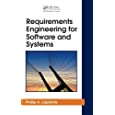 Product Description:
Product Description:
Solid requirements engineering has become increasingly essential to improved on-time and on-budget delivery of software and systems projects. As more engineering programs make it a mandatory part of their curricula, students and working engineers require significant training to master the field, especially the complicated emerging ancillary software tools vital to the requirements engineering process.
With an intentional focus on software-intensive systems, Requirements Engineering for Software and Systems provides a probing and comprehensive review of the state of technology and developments in intelligent systems, soft computing techniques, and their diverse applications in manufacturing.
Topics covered can be applied to the requirements engineering practices for—
- Advanced production machines and systems
- Collaborative and responsive manufacturing systems
- Digital manufacturing
- E-manufacturing
- E-business and virtual enterprises
- Fit manufacturing
- Human machine interfaces
- Innovative design technologies
- Intelligent and competitive manufacturing
- Intelligent planning and scheduling systems
- Mechatronics and MEMS
- Micro and nano manufacturing
- Production automation and control
- Reconfigurable manufacturing systems
- Robotics
- Sustainable manufacturing systems
To illustrate key ideas associated with requirements engineering, the text presents three common example systems: an airline baggage handling system, a point-of-sale system for one location of a large pet store chain, and a system for a “smart home” in which one or more PCs control various aspects of the home’s functions. The selected systems encompass a wide range of applications—from embedded to organic, for both industrial and consumer uses.
Control Systems Engineering
Publisher: Wiley; 6 edition (December 14, 2010)
Language: English
ISBN-10: 0470547561
ISBN-13: 978-0470547564
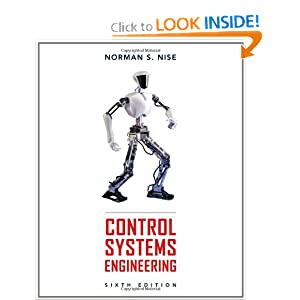 Product Description:
Product Description:
Highly regarded for its case studies and accessible writing, Control Systems Engineering is a valuable resource for engineers. It takes a practical approach while presenting clear and complete explanations. Real world examples demonstrate the analysis and design process. In addition, helpful skill assessment exercises, numerous in-chapter examples, review questions, and problems reinforce key concepts. Tutorials are also included on the latest versions of MATLAB, the Control System Toolbox, Simulink, the Symbolic Math Toolbox, and MATLAB’s graphical user interface (GUI) tools. What if experiments help expand an engineer’s knowledge and skills.
From the Back Cover:
Motivate Students with Real-World Control Systems Emphasizing the practical application of control systems engineering, this 3rd edition with its updated contents will motivate students to learn how to analyze and design feedback control systems that support today’s advanced technology. Motivation is obtained through clear and complete explanations of how to design real-world systems. Topics are presented in a logical and progressive way that builds and supports understanding. Whenever possible, new concepts are first presented from a qualitative perspective to help students gain the insight needed to develop sound designs. Next, a detailed discussion of quantitative tools gives readers the ability to design parameters and configurations for systems they will encounter during their career. And with the use of MATLAB®, students will find out how to apply the latest computer methods to the analysis and design of control systems. Key Features of the Third Edition
Case studies, using the same system progressively, are integrated throughout the text to provide students with a realistic view of each stage of the control system design process.
A methodology with clearly defined steps is presented for each type of design problem.
Numerous in-chapter examples and skill-assessment exercises, as well as end-of-chapter review questions and problems, including a progressive analysis and design problem that uses the same system, are provided.
An introduction to state-space methods of analysis and design is included. These sections are clearly marked and can be taught along with classical methods, taught separately, or skipped without loss of continuity.
Tutorials are provided on how to use MATLAB®, the Control System Toolbox, Simulink®, and the Symbolic Math Toolbox to analyze and design control systems. Also included are tutorials on how to use two MATLAB® graphical user interface (GUI) design and analysis tools — the LTI Viewer and the Root Locus Design GUI. All tutorials and MATLAB® code are contained in the text’s appendices so as not to detract from the teaching of control systems engineering principles. References to these appendices are provided at appropriate places in the text.
An accompanying CD-ROM provides valuable additional material, such as stand-alone computer applications, electronic files of the text’s computer programs for use with MATLAB®, additional appendices, and solutions to skill-assessment exercises. –This text refers to an out of print or unavailable edition of this title.
Customer Service Incorporates Systems Thinking in 2010
Author: Martin Hofschroer
Jo Causon, chief executive of the Institute of Customer Service, told MyCustomer.com that the current climate showed a “renaissance in customer service” as more companies became more aware of consumer needs. Ms Causon said that developments in customer service were shown by the fact that an increasing number of businesses were integrating their service across departments in their organisation. She told MyCustomer: “There is more of a discussion in the boardroom about how we focus on more of a customer-centric strategy rather than it being a bolt-on or just about the delivery aspect.” This approach shows signs of systems thinking as the method is a way of helping people view their organisations not only from a customers’ point of view, but from a broader perspective and focusing on the whole organisation as a complete system. Using systems thinking is beneficial to a business because it is a powerful approach to improving service or production, reducing failure and mistakes, and eliminating waste at every level of the organisation.
Modeling Dynamic Systems – Third Edition
By Diana Fisher
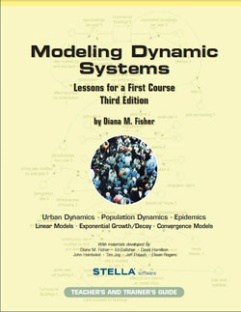 Diana Fisher’s Modeling Dynamic Systems: Lessons for a First Course, the follow-up to her popular Lessons in Mathematics: A Dynamic Approach, provides a set of tools that enable educators at the secondary and college levels to teach a one-semester or one-year course in System Dynamics. Developed for beginning modelers, the lessons contained in this book can be used for a core curriculum or for independent study.
Diana Fisher’s Modeling Dynamic Systems: Lessons for a First Course, the follow-up to her popular Lessons in Mathematics: A Dynamic Approach, provides a set of tools that enable educators at the secondary and college levels to teach a one-semester or one-year course in System Dynamics. Developed for beginning modelers, the lessons contained in this book can be used for a core curriculum or for independent study.
Updated in 2011, the Third Edition incorporates the latest material that Diana uses to teach her own students.
Requirements Engineering: Fundamentals, Principles, and Techniques
by Klaus Pohl
Publisher: Springer; 1st Edition. edition (July 23, 2010)
ISBN-10: 3642125778
ISBN-13: 978-3642125775
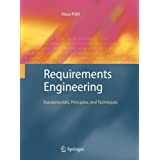 Product Description:
Product Description:
Requirements engineering is the process of eliciting individual stakeholder requirements and needs and developing them into detailed, agreed requirements documented and specified in such a way that they can serve as the basis for all other system development activities. In this textbook, Klaus Pohl provides a comprehensive and well-structured introduction to the fundamentals, principles, and techniques of requirements engineering. He presents approved techniques for eliciting, negotiating and documenting as well as validating, and managing requirements for software-intensive systems. The various aspects of the process and the techniques are illustrated using numerous examples based on his extensive teaching experience and his work in industrial collaborations. His presentation aims at professionals, students, and lecturers in systems and software engineering or business applications development. Professionals such as project managers, software architects, systems analysts, and software engineers will benefit in their daily work from the didactically well-presented combination of validated procedures and industrial experience. Students and lecturers will appreciate the comprehensive description of sound fundamentals, principles, and techniques, which is completed by a huge commented list of references for further reading. Lecturers will find additional teaching material on the book’s website, www.requirements-book.com.
Engineering Mega-Systems: The Challenge of Systems Engineering in the Information Age
by Renee Stevens
Publisher: Auerbach Publications; 1 edition (July 15, 2010)
ISBN-10: 1420076663
ISBN-13: 978-1420076660
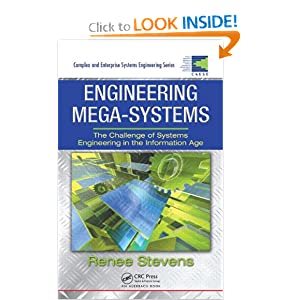 Product Description:
Product Description:
With their ability to cross traditional boundaries and achieve a level of functionality greater than their component elements, mega-systems have helped corporations and government organizations around the world resolve complex challenges that they otherwise couldn’t address with stand-alone systems. Engineering Mega-Systems: The Challenge of Systems Engineering in the Information Age provides a clear understanding of the engineering of this class of systems—a process that demands consideration of increasing program scale and the rapid change of underlying technologies.
Written by Renee Stevens, a Senior Principal Engineer at The MITRE Corporation with decades of experience analyzing, engineering, and acquiring large-scale systems for the U.S. Department of Defense and other government agencies, this book explains how the engineering of mega-systems is inherently different from that of large-scale monolithic systems. It supplies the vocabulary and framework needed to explore the issues relevant to mega-systems. This framework then evolves into the Profiler diagnostic tool that helps you understand the nature and context of the system at hand and, on that basis, select the most appropriate processes, tools, and techniques.
Stevens examines commercial and government applications of mega-systems to provide insight into the contemporary challenges of engineering these systems in three critical dimensions: engineering processes, management processes, and the larger context in which these systems are developed and deployed. Complete with two case studies in engineering mega-systems that illustrate valuable lessons learned and highlight emerging practices, this book supplies the understanding and the tools needed to begin engineering, characterizing, and acquiring mega-systems across multiple dimensions.
10 Useful Ideas on Systems Thinking
by Richard Wilkinson, 2001 – reprinted 11/01/11
“Real life is lived in a complex world system where all the subsystems overlap and affect each other.”
At the heart of systems thinking is the principle of interconnectedness. I compiled the following list to make this core idea translatable to daily life. The ideas presented here are not meant to be the final word on the subject of systems thinking. Indeed, one author listed no less than 28 ideas, a couple of which found their way here, too. This list began in 1995 when the first two entries were shared, appropriately enough, at the conclusion of “The Beer Game”, the famous game developed at MIT to teach systems thinking…..
Panarchitecture: Architecting a Network of Resilient Renewal
by Nick Gall – January 24, 2011
Panarchitecture is a kind of hybrid thinking that combines insights and practices from architectural thinking with those from ecological thinking—specifically the ecological thinking known as panarchy. C.S. “Buzz” Holling coined panarchy as the name of his framework for understanding the dynamics of ecosystems. The pan- in panarchy is meant to connote the Greek god Pan, who is associated with both nature and disruption.
Systems of Systems: Managing Complexity
By General Gaviard
The term “systems of systems” first appears to be an abstruse acronym, but it actually covers a quite simple reality: the networking of several systems, which will thus be able to exchange information and data in real time. The goal: get a more efficient operational synergy.
Regarding the networking itself, the Americans – who have taken the lead in this area – emphasize the word “NCW” (Network Centric Warfare), while NATO chose that of “NEC” (Network Enabling Capabilities). The semantic difference is rather significant, because in the first case the network is seen as a focal point (“Centric”) within the operational system, while in the second it is identified as a support capacity (“Enabling”) to the operations.
Conferences and Meetings
Second International Conference on Exploring Services Sciences (IESS 1.1)
February 16-17-18, 2011, Geneva, Switzerland
The Sixth International Conference on Systems Engineering in Israel
March 8-9 2011, Herzlia, Israel
2011 International Conference on Systems Engineering and Modeling (ICSEM 2011)
March 11 to 13, 2011, Shanghai, Shanghai, China
Resilience 2011 – Resilience, Innovation and Sustainability: Navigating the Complexities of Global Change ![]()
March 11-16, 2011, Arizona State University, Tempe, Arizona, USA
Second ACM/SPEC International Conference on Performance Engineering
(ICPE 2011)
March 14-16, 2011 Karlsruhe, Germany
Design, Automation & Test in Europe
March 14-18, 2011, Grenoble, France
26th Symposium On Applied Computing
March 21 – 25, 2011, Tunghai University, TaiChung, Taiwan
Requirements Engineering Track – 4th Edition
Part of the 26th ACM Symposium on Applied Computing
March 21 – 25, 2011, Tunghai University, TaiChung, Taiwan
ICST Workshop on Requirements and Validation, Verification & Testing (ReVVerT 2011)
Co-located with the 4th International Conference on Software Testing, Verification and Validation (ICST 2011)
March 21-25, 2011 (one day), Berlin, Germany
1st Int’l Workshop on Variability-intensive Systems Testing, Validation & Verification
Co-located with ICST 2011
March 21, 2011, Berlin, Germany
7th Workshop on Advances in Model Based Testing (A-MOST 2011)
Co-located with the 4th International Conference on Software Testing, Verification and Validation (ICST 2011)
March 21, 2011 – Berlin, Germany
Scenario-Based Testing – SCENARIOS 2011
Co-located with the 4th International Conference on Software Testing, Verification and Validation (ICST 2011)
March 21, 2011, Berlin, Germany
IWEI 2011 – The International Working Conference on Enterprise Interoperability
March 22-24, 2011, Stockholm, Sweden
MoBE-RTES 2011 – 2nd IEEE Workshop on Model-based Engineering for Real-Time Embedded Systems
March 28th, 2011, Newport Beach, California
REFSQ 2011 – 17th International Working Conference on Requirements Engineering: Foundation for Software Quality
March 28-30, 2011, Essen, Germany
Engineering Sustainability Debate ![]()
March 30, 2011, City University, London, UK
EPICAL – Workshop on Empirical Research in Requirements Engineering: Challenges and Solutions
March 31, 2011, Essen, Germany
MBT 2011 – Seventh Workshop on Model-Based Testing
April 2-3, 2011, Saarbrϋken, Germany
Satellite workshop of ETAPS 2011
GT-VMT 2011 – International Workshop on Graph Transformation and Visual Modeling Techniques ![]()
April 2-3, 2011, Saarbrücken, Germany
Information Systems Summit II ![]()
April 4 – 6, 2011, Hyatt Regency Baltimore, Baltimore, Maryland, USA
IEEE International Systems Conference
April 4-7, 2011, Montreal, Quebec, Canada
Symposium on Theory of Modeling and Simulation (DEVS/TMS’11)
April 4-9 2011, Boston, MA, USA
1st International Workshop on Model-driven Approaches for Simulation Engineering
Held under the aegis of the Symposium on Theory of Modeling and Simulation, part of the SCS SpringSim 2011 conference.
April 4-9, 2011, Boston, MA (USA)
International Symposium on Ambient Intelligence
April 6-8, 2011, University of Salamanca, Salamanca, Spain
Workshop on the Reliability of Intelligent Environments (WORIE ’11)
within the International Symposium on Ambient Intelligence
April 6-10, 2011, University of Salamanca, Salamanca, Spain
International Conference on Operations Research and Statistics (ORS 2011) ![]()
April 7-8, 2011, Hotel Equatorial Penang, Malaysia
CSER 2011 – Conference on Systems Engineering Research
April 14-16 2011, Redondo Beach Crown Plaza, Redondo Beach, CA, USA
Systems Engineering & Architecting Doctoral Student Network (SEANET) workshop
In conjunction with the 9th Conference on Systems Engineering Research
April 14, 2011, University of Southern California, CA, USA
More information to follow
17th International Conference on Information and Software Technologies
April 27th – 29th, 2011, Kaunas, Lithuania
Second Annual West Point Critical Infrastructure Symposium ![]()
April 29 – 30, 2011, The United States Military Academy in Newark, NJ, USA
SETE 2011 – Systems Engineering and T&E
May 2-4, 2011, Rydges Lakeside, Canberra, Australia
Software & Systems Engineering Essentials
May 9-10, 2011, Frankfurt, Germany
Risk-Based Approaches to Major Decisions (Risk ’11)
May 13 – 14, 2011, Falmouth, Cornwall, United Kingdom
International Conference on Software and Systems Process (ICSSP 2011)
(co-located with ICSE 2011)
May 21-22, 2011, Waikiki, Honolulu, Hawaii, USA
Sixth Workshop on SHAring and Reusing architectural Knowledge (SHARK 2011)
(co-located with 33rd Int. Conf. on Software Engineering (ICSE 2011))
May 21-28, 2011, Waikiki, Honolulu, Hawaii, USA
RSP 2011 – IEEE International Symposium on Rapid System Prototyping
May 24 – 27, 2011, Karlsruhe Institute of Technology (KIT), Karlsruhe, Germany
SPICE 2011 – The 11th International SPICE Conference Process Improvement and Capability dEtermination
30 May – 1 June 2011, Dublin, Ireland
Seventh European Conference on Modelling Foundations and Applications
6-9th of June, 2011, University of Birmingham, Birmingham, UK
TTCN‑3 – 10th Testing & Test Control Notation User Conference
June 7-9, 2011, Bled, Slovenia
4th Symposium on Resilience Engineering
June 8-10, 2011, Sophia Antipolis, France
Security and Privacy Requirements Engineering (SPREE) Workshop ![]()
June 15-16, 2011, Carnegie Mellon University, Pittsburgh, PA, USA
ONTOSE 2011 – 5th International Workshop on Ontology, Models, Conceptualization and Epistemology in Social, Artificial and Natural Systems
June 20, 2011, University of East London – Docklands Campus, London, UK
BPMDS’11 Working Conference
in conjunction with CAISE 2011
June 20-21 in London, United Kingdom
Swiss Requirements Day
June 22, 2011, Kongresshaus, Zurich
FM 2011: 17th International Symposium on Formal Methods
June 20 – 24, 2011, Lero, Limerick, Ireland
The 32nd International Conference on Application and Theory of Petri Nets and Concurrency (PETRI NETS 2011)
11th International Conference on Application of Concurrency to System Design (ACSD 2011)
June 20-24, 2011 Kanazawa Cultural Hall, Kanazawa, Japan
INES 2011 – 15th IEEE International Conference on Intelligent Engineering Systems 2011
June 23-25, 2011, Poprad, High Tatras, Slovakia
CoMetS’11 – 2nd International Track on Collaborative Modeling & Simulation ![]()
20th IEEE International Conference on Collaboration Technologies and Infrastructures
June 27 – June 29, 2011, Paris (France)
SoSE 2011 – 2011 6th International Conference on System of Systems Engineering (SoSE)
Jun 27 – 30, 2011, Albuquerque, New Mexico, U.S.A
ICMT2011 – International Conference on Model Transformation
Theory and Practice of Model Transformations
Co-located with TOOLS Europe 2011
June 27 – July 01, 2011 – Zurich, Switzerland
15th International Conference on System Design Languages
July 5th – 7th, 2011, Toulouse, France
International System Dynamics Conference
July 24 – 28, 2011, Washington, DC, USA
46th Annual International Logistics Conference and Exhibition (SOLE 2011)
August 2011
IHMSC 2011 – International Conference on Intelligent Human-Machine Systems and Cybernetics ![]()
Aug 26, 2011 – Aug 27, 2011, Hangzhou, China
19th IEEE International Requirements Engineering Conference
August 29 – September 2, 2011, Trento, Italy
International Conference on Industrial Engineering, Systems Engineering and Engineering Management for Sustainable Global Development
September 21-23, 2011, Spier Hotel and Conference Centre, Western Cape, South Africa
Second Annual IIBA Conference
October 2011, More details TBA
SASO 2011 – Fifth IEEE International Conference on Self-Adaptive and Self-Organizing Systems ![]()
October 3-7, 2011, Ann Arbor, Michigan, USA
AGTIVE 2011 – International Symposium on Applications of Graph Transformation with Industrial Relevance
October 4‑7, 2011, Budapest, Hungary
NDIA 14th Annual Systems Engineering Conference ![]()
October 24 – 27 2011, Hyatt Regency Mission Bay, San Diego, California, USA
SSEE 2011 – Society for Sustainability and Environmental Engineering 2011 International Conference
October 24-26, 2011, Brisbane Convention & Exhibition Centre, Brisbane, Australia
ICFEM 2011 – 13th International Conference on Formal Engineering Methods![]()
October 25 – 28, 2011, Durham, United Kingdom
CEBM 2011 – 2011 International Conference on Engineering and Business Management (CEBM2011) ![]()
Oct 28 – 30, 2011, Shanghai, China
IIBA 2011 Conference![]()
Oct 30 – Nov 3, 2011, Fort Lauderdale, Florida, USA
21st Annual Systems Thinking in Action® Conference![]()
October 31-November 2, 2011, Westin Seattle Hotel, Seattle, WA, USA
Complex Systems Design & Management 2011![]()
December 7-9, 2011, Cité Internationale Universitaire, Paris, France
Education and Academia
Systems Modeling Language (SysML) Training – A Quick Start to Model-Based Engineering and Model-Based Systems Engineering (MBE/MBSE)
Georgia Tech and InterCAX jointly offer a SysML quick start training program for professionals wanting to learn the latest about model-based engineering (MBE) in general and model-based systems engineering in particular (MBSE). This comprehensive program covers all four OMG Certified Systems Modeling Professional (OCSMP) certification levels and more. The instructors are subject matter experts who have conducted these short courses for numerous organizations since August 2008 training over 465 professionals. Their distinctions include being involved in OMG SysML development from the beginning, being OCSMP exam authors, conducting leading-edge R&D and MBE/MBSE deployment consulting, and serving as leaders in multiple INCOSE & OMG initiatives.
DoD Systems Engineering Research Center (SERC
Mission Statement
The mission of the Systems Engineering Research Center is to enhance and enable the DoD’s capability in Systems Engineering for the successful development, integration, testing and sustainability of complex defense systems, services and enterprises.
As a University Affiliated Research Center (UARC), the Systems Engineering Research Center (SERC) was created to conduct systems engineering research for the Department of Defense (DoD) with the intent of enhancing the definition, synthesis, integration and test, deployment, and support of complex DoD systems and enterprises. SERC will act in four specific areas, providing a research-driven engine for meeting DoD’s systems engineering needs:
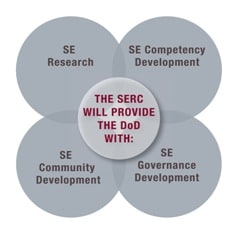 Community Development
Community Development
Lead a national community of SE researchers and educators, focused on DoD challenges.
Systems Engineering Research
Identify, evaluate, create and integrate SE methods, processes and tools.
Competency Development
Develop enhanced SE skills and competencies within DoD and industry.
Governance Development
Build a knowledge base to better assess SE effectiveness and to realize improvements.
The SERC’s vision in providing these services is based on three concepts:
Collaboration
Until the creation of the SERC, there was no single organization with the reach and depth to tackle the kind of systems engineering research needed in our rapidly changing world. Led by Stevens, the SERC collaborators provide a critical mass of systems engineering researchers – a community of broad experience, deep knowledge, and diverse interests. Our researchers have worked with a wide variety of domains and industries, and so are able to bring views and ideas from beyond the traditional defense industrial base. Establishing such a community of focused SE researchers, while challenging, promises results well beyond what any one university could accomplish.
Innovation
The SERC believes this new community of researchers is an incubator for new and innovative ideas for understanding and improving systems engineering in the DoD space. Innovation is key in finding answers for the critical issues in systems engineering. Some of that innovation will come from cross-discipline research where systems engineering and systems thinking can share ideas with disciplines like biology and sociology where systems are key components. Innovation also includes applying systems thinking concepts to our own research projects and agendas. However, even as we look for new ways, we must integrate the accomplishments and knowledge of the past.
Practicality
Above all, the research undertaken by the SERC must be useful, applicable to real problems, and relevance the key concerns and challenges of today and tomorrow. Systems engineering is a practice-oriented discipline and so we must remain engaged with those on the front lines of systems definition and development. We will conduct research to discover new ways to approach existing and future problems. Guided by DoD’s systems engineering challenges, we see the SERC as an engine for creating solutions that provide ongoing improvement of the defense systems engineering capability through enhanced practices, education, and tools.
Summer Courses at Harvard – Systems Thinking
How we explore the challenges we face is often framed by the approaches and strategies we use to examine them. This course in systems thinking assesses system behaviors by examining the entire system – including human, political, community, resource, environmental, and social processes – to get a holistic view into how organizations and individuals often look at the world, assess problems, and invent solutions. And since the way systems are designed determines outcomes, we also look at the intended and unintended consequences of various actions. Using nonlinear thinking to complement our typical linear way of thinking can lead to deeper insight into problems and potential solutions, which is the focus of this course. (4 credits)
ISU/Stevens Graduate Certificate in Space Systems Engineering
To respond to the demand for an in-depth technical degree offering, the International Space University (ISU) and Stevens Institute of Technology have joined forces to offer a Graduate Certificate in Space Systems Engineering that can lead to either a Master’s Degree in Space Systems Engineering, or a Master’s Degree in Systems Engineering with a Graduate Certificate in Space Systems Engineering. Online courses begin in January 2011.Clickhere to enquire or enroll.
Download the PDF flyer: ![]() SIT-ISU Systems Engineering Information
SIT-ISU Systems Engineering Information
Immediate Postdoctoral Opening in Systems Requirements Engineering at Masdar Institute
Masdar Institute of Science and Technology has an immediate postdoctoral opening in systems requirements engineering in duration of 1 year (with possibility of extension).
Requirements: PhD with specialization in software engineering, systems engineering, requirements engineering, or computer science and interest in applying your knowledge to advanced energy systems and smart power grids research problems. Strong programming skills are necessary; knowledge of Matlab or Python and experience in simulation development will give you an additional advantage.
Assistant Professor of Systems Engineering (2 Positions)
The Division of Engineering’s Systems Engineering Program at Southern Polytechnic State University, Marietta, Georgia (www.spsu.edu) invites applications for two full-time tenure-track positions at the assistant professor level (other ranks considered) to begin in August 10, 2011.
Newcastle University: Lectureship in Dependable Architectures
Following excellent results in RAE2008, the School of Computing Science at Newcastle University (UK) is undertaking a second significant investment in new academic posts. If you are a researcher of outstanding promise or with a world-class research record, and your interests and skills align with those that they are looking for, they would like to hear from you.
Immediate Postdoctoral Opening in Systems Requirements Engineering at Masdar Institute
Masdar Institute of Science and Technology has an immediate postdoctoral opening in systems requirements engineering in duration of 1 year (with possibility of extension).
Some Systems Engineering-Relevant Websites
Standards and Guides
ISO/IEC JTC 1/SC 35 – User interfaces
The JTC1 SC 7 website lists a host of information on this sub-committee. It includes the following list of working groups:
| JTC 1/SC 35/WG 1 | Keyboards and input interfaces The convener can be reached through the secretariat |
| JTC 1/SC 35/WG 2 | Graphical user interface and interaction The convener can be reached through the secretariat |
| JTC 1/SC 35/WG 4 | User interfaces for mobile devices |
| JTC 1/SC 35/WG 5 | Cultural and linguistic adaptability The convener can be reached through the secretariat |
| JTC 1/SC 35/WG 6 | User interfaces accessibility The convener can be reached through the secretariat |
| JTC 1/SC 35/WG 7 | User interfaces object, actions and attributes |
| JTC 1/SC 35/WG 8 | User interfaces for remote interactions |
The SC35 Business Plan for the JTC 1 Plenary, Belfast, UK, 2010-11-08 to 13 provides a management summary, a period review and the focus for next work.
The statement of scope is stated as:
Standardization in the field of user-system interfaces in information and communication technology (ICT) environments and support for these interfaces to serve all users, including people having accessibility or other specific needs, with a priority of meeting the JTC 1 requirements for cultural and linguistic adaptability.
The work programme for ISO/IEC JTC 1 SC 35 is set out on the ISO website in terms of the standard or project, the Standards Development Process Stage code and the International Classification for Standards (ICS) reference.
IEEE Standards Association (IEEE-SA)
The IEEE Standards Association (IEEE-SA) is a leading consensus building organization that nurtures, develops and advances global technologies, through IEEE. They bring together a broad range of individuals and organizations from a wide range of technical and geographic points of origin to facilitate standards development and standards related collaboration. With collaborative thought leaders in more than 160 countries, we promote innovation, enable the creation and expansion of international markets and help protect health and public safety. Collectively, our work drives the functionality, capabilities and interoperability of a wide range of products and services that transform the way people live, work and communicate.
The IEEE-SA is governed by the Board of Governors (BOG) who are elected by IEEE-SA Members. The Board of Governors oversees number of committees that are dedicated to manage key operational aspects of the IEEE-SA. The IEEE-SA Standards Board reports directly to the BOG, and oversees the IEEE standards development process. Standards Board members are elected by IEEE-SA members as a privilege of membership, and all Board Members and Committee members must be IEEE-SA members in good standing.
The IEEE-SA standards development process is open to IEEE-SA Members and non-members, alike. However, IEEE-SA Membership enables standards development participants to engage in the standards development process at a deeper and more meaningful level, by providing additional balloting and participation opportunities. IEEE-SA members are the driving force behind the development of standards, providing technical expertise and innovation, driving global participation, and pursuing the ongoing advancement and promotion of new concepts.
Should SC7 Develop Competency Standards
Posted by Tom McBride on ISO/IEC JTC 1/SC7 Software and Systems Engineering LinkedIn Group
A Definition to Close on
TBD
PPI News
TBD
PPI Events (see www.ppi-int.com)
Systems Engineering Public 5-Day Courses (2011)
{Julie to plug in}
Requirements Analysis and Specification Writing Public Courses (2011)
{ Julie to plug in}
Software Engineering Public 5-Day Courses (2011)
{ Julie to plug in}
OCD/CONOPS Public Courses (2011)
{ Julie to plug in}
Cognitive Systems Engineering Courses (2011)
{ Julie to plug in}
PPI Upcoming Participation in Professional Conferences
{ Julie to plug in}
Kind regards from the SyEN team:
Robert Halligan, Managing Editor, email: rhalligan@ppi-int.com
Alwyn Smit, Editor, email: asmit@ppi-int.com
Luke Simpson, Production, email: lsimpson@ppi-int.com
Project Performance International
2 Parkgate Drive, Ringwood, Vic 3004 Australia
Tel: +61 3 9876 7345
Fax: +61 3 9876 2664
Tel Brasil:
Tel UK:
Tel USA:
Web: www.ppi-int.com
Email: contact@ppi-int.com
Copyright 2009 Project Performance (Australia) Pty Ltd, trading as Project Performance International
Tell us what you think of SyEN: email to contact@ppi-int.com
If you do not wish to receive a copy monthly of SyEN in future, please reply to this e-mail with “Remove” in the subject line. All removals are acknowledged; you may wish to contact PPI if acknowledgement is not received within 7 days.
